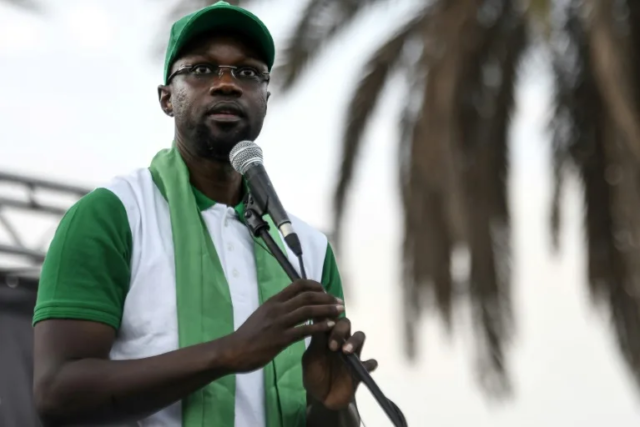
Jailed Senegalese opposition leader Ousmane Sonko, on hunger strike since shortly after his arrest last month, was admitted to hospital in Dakar Sunday, his lawyer and supporters said.
His party, PASTEF, said in a statement that he had been admitted for emergency care, which was confirmed by two spokesmen and Cire Cledor Ly, one of his lawyers, although they did not discuss his condition.
In its statement PASTEF said the authorities were “responsible” for Sonko’s condition. There has been no statement from the authorities on the matter.
Sonko, 49, started his hunger strike on July 30, two days after he was arrested.
A declared candidate for the February 2024 presidential election, he has been engaged in a bitter power struggle with the authorities since 2021 when he was placed under investigation in a moral corruption case.
On June 1, Sonko was sentenced in absentia to two months in prison. He and his supporters denounced the conviction as politically motivated.
That conviction sparked clashes that left 16 dead according to the government, 24 according to Amnesty International, and 30 according to Sonko’s PASTEF party.
Late in July he was arrested and on Monday, he was charged with fomenting insurrection and his party dissolved, setting off more protests in which two people were killed.
– Eligibility for office –
His convictions and the charges now laid against him raise a question mark over his eligibility to run for the presidency next year, although his lawyers insist that he can still run.
In the moral corruption case, they insist that as Sonko refused to attend his trial and as he was convicted in his absence, the law requires that he has to be retried now that he has been arrested.
His lawyer Ly said Sonko had written to the courts the previous week making it clear that he did not accept his conviction, which he said was enough to require that his conviction be quashed and he be retried.
Prosecutor Abdou Karim Diop has rejected that interpretation of the law.
On Saturday, Senegal’s parliament passed a law that effectively restored the right of two key opposition deputies to run in the country’s presidential election next year.
The vote cleared any person convicted but then either pardoned or amnestied to run for office, paving the way for Khalifa Sall and Karim Wade, who would otherwise have been ineligible.






